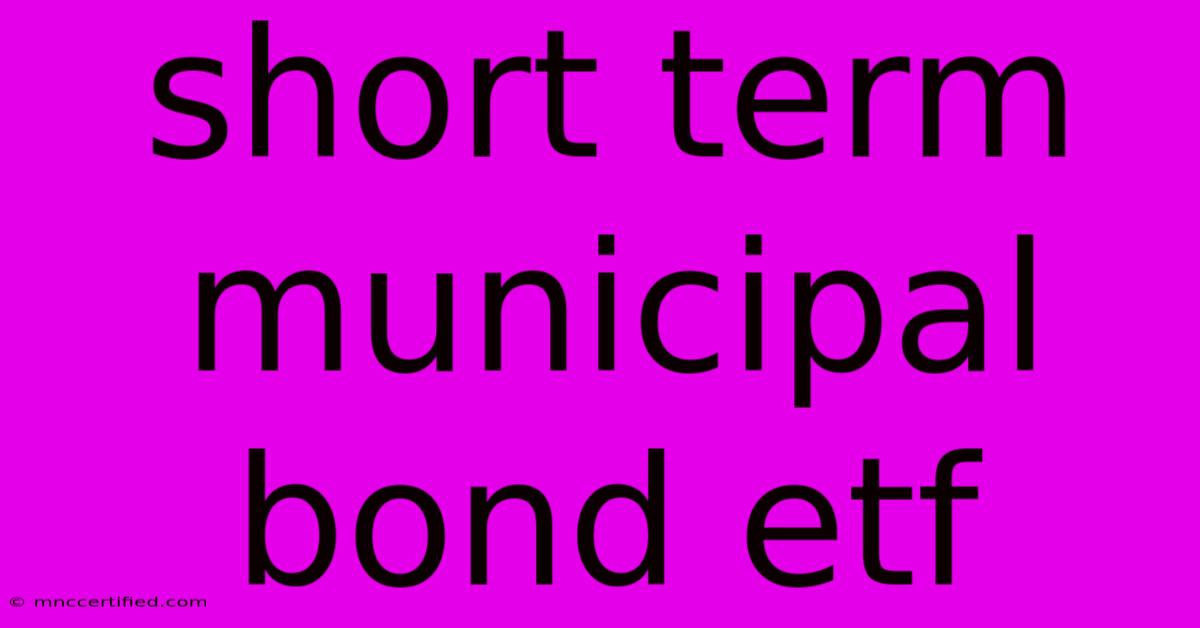Short Term Municipal Bond Etf

Table of Contents
Short-Term Municipal Bond ETFs: A Safe Haven for Your Investments
Investing can be daunting, especially when navigating the complexities of the bond market. However, for investors seeking relatively low-risk, tax-advantaged income, short-term municipal bond ETFs offer a compelling option. This article delves into the intricacies of these ETFs, exploring their benefits, risks, and how they can fit into your overall investment strategy.
What are Short-Term Municipal Bond ETFs?
Short-term municipal bond ETFs (Exchange-Traded Funds) are investment vehicles that track a portfolio of municipal bonds with short maturities—typically less than three years. These bonds are issued by state and local governments to finance public projects like schools, roads, and hospitals. The key advantage? The interest income generated is usually exempt from federal income tax, and often from state and local taxes as well, depending on your residency. This tax advantage significantly boosts the after-tax returns compared to taxable bond funds.
Key Features of Short-Term Municipal Bond ETFs:
- Lower Interest Rate Risk: Short maturities minimize the impact of interest rate fluctuations. When interest rates rise, the value of longer-term bonds falls more sharply. Short-term bonds are less susceptible to this risk.
- Higher Liquidity: Short-term bonds are generally easier to buy and sell than longer-term bonds, contributing to greater liquidity in the ETF.
- Tax Advantages: The primary allure of municipal bonds is their tax-exempt status. This significantly improves your overall return, especially in higher tax brackets.
- Diversification: ETFs provide instant diversification across numerous municipal bonds, reducing the risk associated with investing in a single bond.
Benefits of Investing in Short-Term Municipal Bond ETFs
- Preservation of Capital: Short-term municipal bond ETFs are generally considered a relatively safe investment, focusing on capital preservation rather than significant capital appreciation.
- Stable Income Stream: They provide a consistent stream of tax-advantaged income, ideal for supplementing retirement income or achieving specific financial goals.
- Ease of Access: Unlike individual municipal bonds, ETFs are easily bought and sold through brokerage accounts, offering convenient access to this asset class.
- Transparency: The holdings and performance of the ETF are publicly available, allowing investors to monitor their investment effectively.
Risks Associated with Short-Term Municipal Bond ETFs
While generally considered low-risk, it's crucial to acknowledge potential drawbacks:
- Interest Rate Risk (albeit minimized): Even short-term bonds are susceptible to some interest rate risk, although the effect is significantly less than with longer-term bonds.
- Default Risk: Although rare, there's a small chance that the issuer of a municipal bond could default, leading to a loss of principal. Well-diversified ETFs mitigate this risk, but it's not entirely eliminated.
- Inflation Risk: The real return (after inflation) could be lower if inflation outpaces the interest earned on the bonds.
- Credit Risk: The creditworthiness of the issuers impacts the ETF's performance. Focus on ETFs that invest in higher-rated bonds to minimize this risk.
Choosing the Right Short-Term Municipal Bond ETF
Selecting the appropriate ETF requires careful consideration of factors such as:
- Expense Ratio: Opt for ETFs with low expense ratios to maximize your returns.
- Average Maturity: While "short-term" is generally under three years, pay attention to the average maturity of the bonds held within the ETF.
- Credit Quality: Examine the credit ratings of the bonds within the ETF's portfolio. Higher-rated bonds generally offer lower risk.
- Tax Efficiency: Consider the ETF's tax efficiency, as this can impact your overall after-tax return.
Short-Term Municipal Bond ETFs vs. Other Investment Options
Compared to other investment options, short-term municipal bond ETFs offer a unique blend of risk and return. They are less volatile than stocks but generally offer lower returns than higher-risk investments like stocks or corporate bonds. They are a suitable complement to a diversified portfolio, offering stability and tax advantages.
Conclusion
Short-term municipal bond ETFs provide a valuable tool for investors seeking a relatively safe, tax-advantaged investment option. By carefully considering the benefits, risks, and your individual financial goals, you can determine whether incorporating these ETFs into your portfolio is the right strategic move for you. Remember to conduct thorough research and consult with a financial advisor before making any investment decisions.

Thank you for visiting our website wich cover about Short Term Municipal Bond Etf. We hope the information provided has been useful to you. Feel free to contact us if you have any questions or need further assistance. See you next time and dont miss to bookmark.
Featured Posts
-
Bond Number 9 New York Nights
Nov 28, 2024
-
Heaven Hill 7 Bottled In Bond
Nov 28, 2024
-
Vauxhall Luton Factory Closure Confirmed
Nov 28, 2024
-
Watch Appraisal For Insurance
Nov 28, 2024
-
Ronin Crypto Price Prediction
Nov 28, 2024